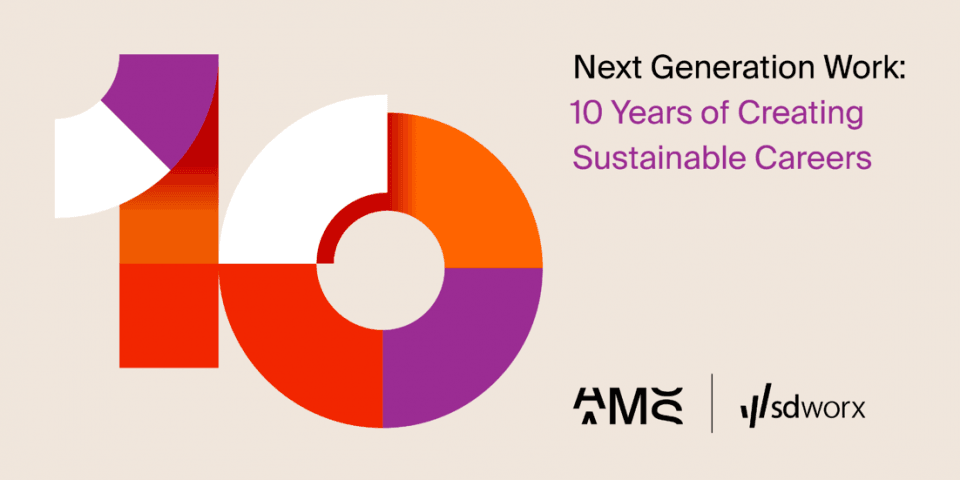In essence, a career is the pattern of work-related experiences a person has during his professional life. It is a complex mosaic of objective situations and events and their subjective interpretations. In short, the work we do every day and how that makes us feel. This turns a career into an individual and highly complex matter.
No two people have exactly the same career experiences. And what we need to stay productive, (mentally) healthy and fulfilled at work can change over the years. This makes it rather hard for organizations to get a grip on the individual career of each employee. Moreover, that career is not owned by the organization but by the employee.

This idea of career ownership is nothing new: during a survey in 2012, 64% of employers already indicated that employees are responsible for their own careers, while 61% of employees actually felt responsible for their own careers. The coronavirus crisis seems to have reinforced this feeling: our most recent survey shows that 55% of employees have started thinking more about their own careers as a result of the pandemic. Two out of three also feel competent to take control of their own careers.
In charge of your career?
Yet, this idea of career ownership is hardly reflected in employee behavior and organizational strategies. For instance, in 2016, only 18% of the surveyed organizations offered career guidance to all employees, in addition to 30% that provided career guidance on a selective basis for specific target groups. A survey of employees in 2020 found that about four in ten take no initiative whatsoever to maintain their knowledge and skills.
So a paradox is emerging: although numerous employees feel they are in charge of their own career, and although organizations recognize the importance of sustainable careers, when it comes down to it, they are reluctant to let go of certainties or to actively engage in a career discussion. Employees often still reflect too little on what they need and what they can do themselves to stay fulfilled, healthy and productive. And in most organizations’ career policies there is still a one-sided focus on well-trodden paths and on leveraging employee strengths rather than investing in competence development. So it comes down to creating a context in which employees can, and are willing to, take charge of their own careers.
It’s your move (with a little encouragement)
For some years now SD Worx has been focusing on sustainable employability, adopting the motto ”It's your move”. Tony Swinnen, HR Talent & Development Expert at SD Worx, explains: "HR policy provides a whole set of supporting measures. Employees can ask for career coaching, take online competency assessments, follow training courses, etc. We also promote internal mobility. Employees can work on their professional and personal development by taking on new tasks or participating in projects. We are now also extending this principle to external employees, who can get a taste of SD Worx and the job itself through well-defined entry-level jobs, before making their final decision.
We have noticed, however, that not all employees have the right mindset or competencies to take control of their own career. Employees understandably sometimes need a little encouragement. That's why we are focusing on three future competencies to begin with: Agility, Connecting, and Think and act outside in. These three competencies should future-proof our workforce and increase their employability within SD Worx. In addition, we are updating our development plans by including feedback, recognition, and networking, with a focus on development. In this way we hope to put employees in the driver’s seat of their employability, but not without giving them a helping hand. Let us say that today our motto, more accurately, should be: It's your move (with a little encouragement)."
Make career guidance the beating heart of your HR policy
As an organization, you can encourage career ownership by focusing on facilitating careers rather than managing them. This of course requires more than mere structural adjustments or stand-alone initiatives. What you actually need is to change your organizational culture: it's about paying attention, asking questions, empowering employees, and providing a framework that encourages them to think about their talents, needs and ambitions and to learn to align these with the organizational needs. This will definitely pay off, as is demonstrated by our research into the return on investment of career policies.
YOU drive your career
Over the years, Janssen Pharmaceutica has built a strong reputation when it comes to driving and taking charge of your own career. In 2013 the Talent Fit Center was launched, dedicated to the vision “YOU drive your career”. By now, the Talent Fit Center has supported almost 700 employees through in-depth career coaching. The effects prove to be highly impactful: employees feel more confident about themselves, they look more positively to the future, and they do take actions to develop their career. Close to 1,500 employees have been trained by the Talent Fit Team on HOW to drive their own career. Based on their personal career profile and the skills they can still develop, they have learned to look more openly, to embrace career opportunities, to know what they want in their career and to take the next career step. People leaders are supported as well, as they are a key enabler in facilitating career opportunities for their team members through engaging in open and clear career discussions.
A more dynamic view on careers and career development thus offers opportunities for both parties. Employees get to focus more on their strengths and further develop their talents, taking into account their personal context and possibilities. And organizations get to deploy people more flexibly depending on changing needs. A sustainable career policy will always seek and monitor the synergy between the two.
Read more
- De Vos, A., & Cambré, B. (2017). Career management in high‐performing organizations: A set‐theoretic approach. Human Resource Management, 56(3), 501-518.
- De Vos, A., Dujardin, J.M., Gielens, T., & Meyers, C. (2016). Developing sustainable career across the lifespan: European Social Fund network on Career and AGE (Age, Generations, Experience). Dordrecht, The Netherlands: Springer. ISBN 978-3-319-47740-4.
10 blog posts for 10 years of Next Generation Work
This blog post is the eight in a series of 10. In each blog post we will offer solutions from different perspectives, as a count down to November 2021, the moment when we bring everything together in the celebration of 10 years of Next Generation Work. We already look forward to welcoming you there. More information will follow in the next few months.

Comments0
Please log in to see or add a comment
Suggested Articles


